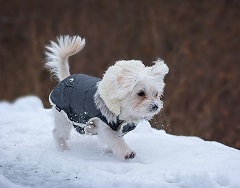
During the cold winter weather, there are a few things that responsible pet owners should be aware of to ensure a safe comfortable season for their pets.
Pets still enjoy time outdoors during the winter season, however, time spent outside should be limited based on the temperature, their acclimation to cold weather and breed/coat-type.
If your pets refuse to walk or ask to go inside, it is a clear sign they have had enough and need to warm up.
While people think cats’ and dogs’ fur alone is enough to keep them warm, many pets especially those with short coats benefit from jackets or sweaters when outside in the wind and snow.
Booties are also very important if you are walking on salted sidewalks or roads. Salt can burn and injure pets’ paws.
Also don’t forget to check for and remove any ice balls that may get stuck in between your pet’s toes.
Check out www.Ruffwear.com for some great clothing, boots and toys!
During the holiday season, many decorations appear like new exciting toys to our pets. Be sure your Christmas tree is stable and anchored. Cats and dogs may want to play in or under the tree and accidentally knock it down causing a big mess and possibly injury.
Remember that cats love ribbon and tinsel. Ingestion of these long strings can cause GI obstructions and require emergency abdominal surgery.
Please bring your pet to your veterinarian immediately if you know of ingestion or observe vomiting.
Also do not leave candles unattended. A curious kitten or table-clearing Labrador tail may accidentally lead to a fire in the home or serious burns to your pet.
Use caution so everyone can have a fun but safe holiday season.
Antifreeze, which contains ethylene glycol (EG), is extremely dangerous to dogs and cats. Ethylene glycol can also be found in windshield deicing agents. Given its sweet smell, it is attractive to pets and even children.
Signs of ethylene glycol toxicity include vomiting, excessive thirst and urination, drunkenness, panting, lethargy and sedation.
As little as a tablespoon can result in severe acute kidney failure in dogs, while as little as 1 teaspoon can be fatal to cats.
When dogs or cats are exposed to ethylene glycol, immediate treatment is necessary.
If you are feeding and caring for outdoor feral cats, remember they need extra help throughout the winter months.
Make sure fresh unfrozen water is available.
Provide them with extra food because cold weather requires animals to burn more calories to stay warm.
Offer some kind of shelter so they can escape from the elements.
Deep dry straw bedding is an inexpensive warm bed for outdoor animals, but you can also find heated mats and outdoor heated kitty houses at pet stores and online that outdoor cats love.